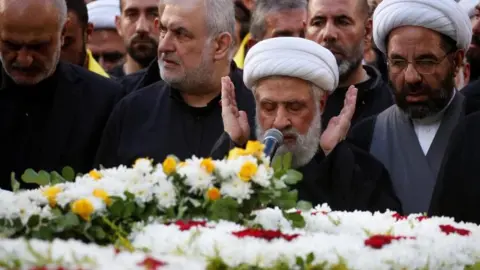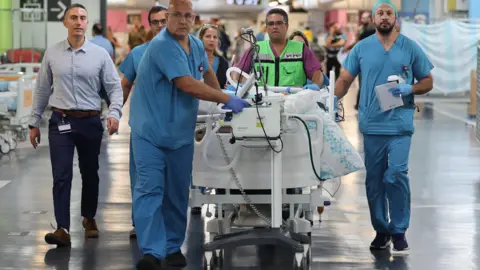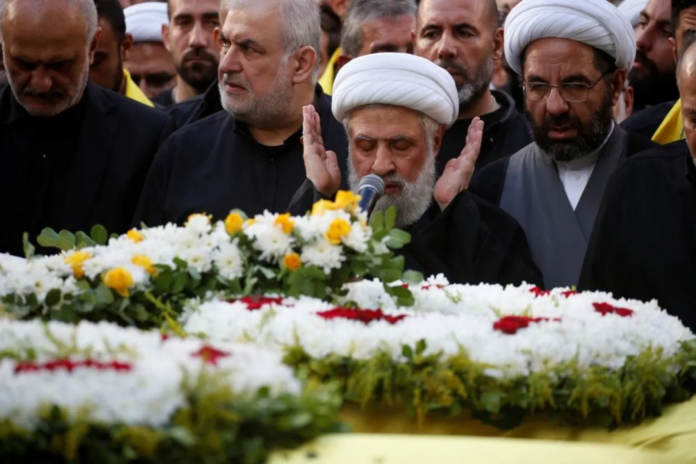Israel and Hezbollah both threatened to increase their cross-border attacks on Sunday, despite international appeals for them to step back from all-out war.
Israel’s military said about 150 rockets, missiles and other projectiles were fired at its territory overnight on Saturday and early on Sunday – mostly from within Lebanon.
Some reached further than previous strikes, sending thousands of Israelis to bomb shelters and damaging homes near the city of Haifa.
Israel launched its own strikes on targets in southern Lebanon, which it said destroyed thousands of Hezbollah’s rocket launchers.
He said Israel had dealt “a series of blows on Hezbollah that it could have never imagined”. But the group’s deputy leader Naim Qassem declared: “Threats will not stop us… We are ready to face all military possibilities”.
Speaking at the funeral of Ibrahim Aqil, a high-ranking Hezbollah commander killed in Israel’s Friday strike on Lebanon’s capital, Beirut, he said: “We have entered a new phase, namely an open reckoning” with Israel.
Sheikh Nadeem Qassem told mourners that Israel had failed in all its aims, while the resistance – meaning Hezbollah – had continued firing for the last three days.
He said more Israeli residents would be pushed out from their homes in the north of the country, adding that Israel had failed to break the group’s resistance and connection with Gaza. Hezbollah is allied with Hamas, which is also part of Iran’s so-called “Axis of Resistance”.
Huge crowds lined the streets and followed the coffin as it was driven on an elevated platform on the back of a pick-up truck.
Among the grief and anger at the funeral, there was a message of defiance from the gathered Hezbollah supporters – including chants of “death to America” from the crowd.
The ceremony took place in a square in the southern suburb of Dahieh in Beirut, the heartland of Hezbollah, just a few streets away from Friday’s air strike.

Aqil had many enemies, and a bounty of $7m on his head. He was wanted by the US for his alleged links to the killing of hundreds of Americans in Beirut in the 1980s – in attacks on the US Embassy and a Marine barracks.
About 30 civilians were also killed in Friday’s Israeli strike, including entire families. At the scene today, relatives remained at the edge of a vast crater, hoping for remains to be found.
Lebanese Minister for Public Works Ali Hamie – who is linked with Hezbollah – said Israel is dragging the region to war.
“At the end, Lebanon is not seeking the war,” he told the BBC at the scene of the strike.
“Even the Lebanese people. But Israel is calling us worldwide, come to war. Come to war.”
Asked if he thought war would happen, he replied: “I don’t know, we will see.”
Hezbollah is the most powerful political and military organisation in Lebanon. The Shia Muslim organisation is better armed than many nations. It is classed as a terrorist organization by countries including the UK and the US.
Fighting between Hezbollah and Israel escalated on 8 October 2023 – the day after the attack on Israel by Hamas gunmen from Gaza – when Hezbollah fired at Israeli positions.
About 1,200 people were killed and more than 250 taken hostages in the Hamas attacks on southern Israel, while 60,000 people in the north have been evacuated as a result of near-daily rocket attacks by Hezbollah since.

UN chief Antonio Guterres told CNN he feared “the possibility of transforming Lebanon [into] another Gaza”.
The UN special co-ordinator in Lebanon, Jeanine Hennis-Plasschaert, posted on X that the Middle East was on the brink of “imminent catastrophe”.
“It cannot be overstated enough: there is NO military solution that will make either side safer,” she posted on Sunday.
US President Joe Biden said Washington would do “everything we can to keep a wider war from breaking out”.
The EU said it was “extremely” concerned, while UK Foreign Secretary David Lammy called for an “immediate ceasefire”.
The Israel Defence Forces (IDF) said many of the projectiles it faced had been intercepted overnight on Saturday, including two that had been launched from Iraq.
The Islamic Resistance in Iraq, a Iran-backed group, said it had fired cruise missile and explosive drone attacks at Israel.
Northern Israel remains on high alert, with schools closed and hospitals moving patients underground. People there have been told to restrict outdoor gatherings to fewer than 10.
One resident of Kirayt Bialik on the outskirts of Haifa, which was hit by rocket fire, told Reuters news agency: “Around 06:30 there was an alarm and then immediately afterwards a big explosion – very, very big explosion – even three or four houses from here. Our window in the main room was completely destroyed.”
Earlier this week, 39 people were killed and thousands wounded after pagers and walkie-talkies used by Hezbollah, the politically-influential Iran-backed organisation, exploded on two days across Lebanon.
On Thursday, Hezbollah leader Hassan Nasrallah blamed Israel for the attacks, saying it had crossed “all red lines” and vowed “just punishment”. Israel has not claimed responsibility.
As fears increase that the conflict may break out into a full-scale war, the US state department issued new travel advice for citizens currently in Lebanon.
The US embassy in Beirut urged people to “depart Lebanon while commercial options still remain available”.
Neighbouring Jordan’s foreign ministry issued similar advice to its citizens, urging those in Lebanon to leave as soon as possible.

